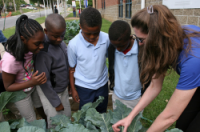Youth Gardening
Pulaski County students learn about growing vegetables in their school garden.
Gardening is a great hands on activity at any age. It's never too early to introduce
a child the wonders of gardening. The classroom is right outside your door.
Gardening does not have to be on a grand scale. It is best when beginning a garden
to start small. It is easy to add to the garden and make improvements after having
success. From school gardens to community gardens, youth gardening is a positive hands
on activity to engage kids in an outdoor setting.
Junior Master Gardener Program
The Junior Master Gardener Program is a national program that focuses on curriculum
for grades 3 to 8.
If making plantable greeting cards, discovering the world of worms, and creating your
own spider webs sounds interesting, the Junior Master Gardener® program is for you!
Modeled after the extremely successful Master Gardener program, the JMG® program offers
horticultural and environmental science education, in addition to leadership and life
skills, through activities that are both creative and fun.
The JMG® program currently offers programs for grades three through eight, and is
developing to include youth from preschool to 12th grade, and is available to groups
in multiple arenas, such as school, community, and 4-H clubs.
What are the benefits of the Junior Master Gardener program?
The JMG® program gives young people the opportunity to contribute to their community,
school and family by helping them become good gardeners as well as good citizens.
®
How do you get a program started?
Getting started is usually the difficult part in any project. However, the JMG® program
offers resources to help from the very beginning. Groups can contact the JMG® headquarters
and receive help with curriculum and program development.
After the program has been initiated, JMG® headquarters will continue to assist the
new program by offering program management information, assisting in securing financial
resources, and recognition. In addition, the tools available to registered groups
are so informative and helpful that prior knowledge of gardening is not necessary.
For example, the Teacher/Leader handbook provides eight instructional chapters followed
by a diverse selection of group projects from which to choose.
If you are interested and would like more information, contact Randy Forst or Julie
Treat at (501) 671-2231.
Learn more about the Junior Master Gardener program.
